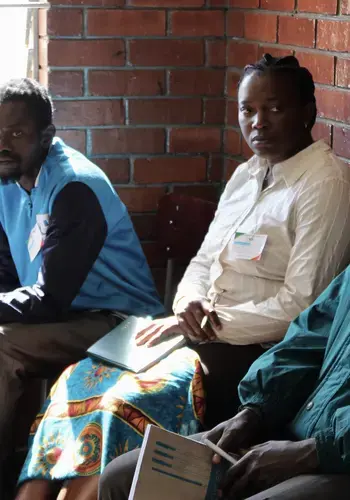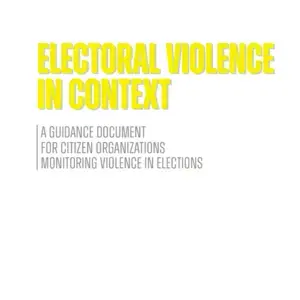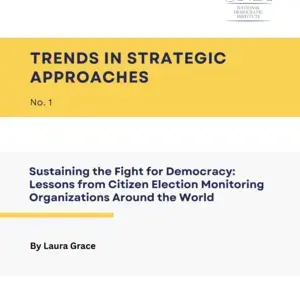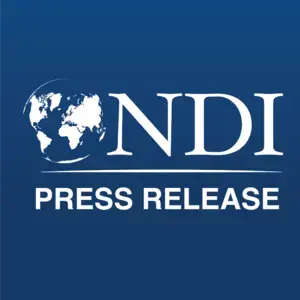Jerry Hartz, [email protected] +1-202-728-5500Morgan Martinez, [email protected]+1-202-572-1531
Harare, Zimbabwe—The joint International Republican Institute (IRI) and National Democratic Institute (NDI) Zimbabwe International Election Observation Mission (ZIEOM) hosted a six-person post-election delegation to Harare on September 4-8, 2018. As part of its comprehensive effort to observe the July 30, 2018, harmonized elections, the ZIEOM’s post-election delegation was co-led by Ambassador Johnnie Carson and Constance Newman both former U.S. Assistant Secretaries of State for African Affairs. The delegation also comprised John Tomaszewski, IRI Regional Director for Africa, Richard L. Klein, NDI Senior Advisor for Electoral Processes, Jessica Keegan, ZIEOM Co-Director, and Amanda Domingues, ZIEOM Inclusion Analyst.
Elections are not a one-day event, but a process that begins well before Election Day and extends through the tabulation and announcement of results, resolution of electoral disputes, and the taking of office by winning candidates. Recognizing this, the ZIEOM began its observation in April 2018 and will conclude its mission in October. As part of its observation effort, the ZIEOM deployed a core team of election analysts starting in April; a pre-election delegation in June; long-term observers across all ten provinces from June through September; an Election Day delegation with approximately 60 observers across the country; and this post-election delegation. The ZIEOM has carried out all of its activities according to the Declaration of Principles for International Observation, in conformity with the laws of Zimbabwe, and in reference to international and regional standards for democratic elections.
The 2018 harmonized elections took place against a backdrop of 18 years of political crisis. During that period, political space was severely limited and a series of fundamentally flawed elections characterized by widespread violence and weakened public confidence in governing institutions and the electoral system. Extraordinary steps were therefore required to restore public trust and set the country on a new trajectory. The 2018 harmonized elections needed to break with past practices to be broadly viewed as inclusive, transparent, and genuine. For the election process to achieve this, it requires more than just adhering to the letter of the law, showing more than only incremental improvements and resulting in more than a generally peaceful outcome.
With regard to the pre-election period, the ZIEOM found that while there had been some notable improvements, they were insufficient to establish strong confidence among political competitors and Zimbabwe’s divided populace. Improvements noted by the ZIEOM included a public commitment to credible elections, advances in the political climate, welcoming of international observers, and a fresh voters roll. However, a number of issues caused serious concern, including: credible questions raised about the independence of the Zimbabwe Election Commission (ZEC), inordinate media bias, intimidation of voters, partisan actions of some traditional leaders, politicization of food aid, the low number of women candidates fielded, false information circulated to undermine confidence in secrecy of the vote, under registration of urban voters, and failure to provide the preliminary voters roll in electronic format. As noted in the ZIEOM’s August 1 Preliminary Statement, overall, the pre-election process did not meet the mark.
Zimbabweans came out on Election Day in great numbers. The voter turnout of approximately 85 percent demonstrated the populace’s desire for democratic governance and enthusiasm to participate in the electoral process. The polls were generally administered in accordance with procedures, and the voting environment was peaceful. In the densely populated urban areas of Harare, the ZIEOM noted long lines at some polling centers with confusion among voters about which sub-polling place was theirs resulting in voters being turned away and not permitted to vote. In addition, citizen observers reported high-levels of assisted voting, which could compromise the secrecy of the ballot. Comparative electoral experience shows that such problems may have significant impacts, particularly on close elections.
The immediate post-election period was seriously marred on August 1 by the excessive use of force, when the Zimbabwe Defence Forces opened fire killing six individuals as it sought to quell protests over the ZEC’s delayed reporting of presidential election results. Further tainting the immediate post-election period were credible reports to the ZIEOM of reprisals against opposition activists in certain parts of the country, and calls for the arrests of senior opposition officials. Among those arrested were newly elected Member of Parliament (MP) and opposition youth leader Happymore Chidziva and MP-elect and former Minister Tendai Biti, who was forcefully removed from Zambia where he sought political asylum. The disposition of criminal cases, such as Biti’s, are still pending.
The ZEC released presidential election results in the aggregate on August 3 and within 24 hours provided polling station level results on CD-ROMs to stakeholders, which was an important act of transparency that allowed independent analysis of the results. Statistical analysis by citizen observers, who also noted pre-election and Election Day problems, found that the ZEC’s announced presidential results to be within a credible statistical range, though the margin of error indicated that a presidential runoff election was also within that range. The leading opposition candidate Nelson Chamisa challenged the ZEC’s announcement that incumbent President Emmerson Mnangagwa had won the election with just over 50 percent of the vote, narrowly avoiding a runoff.
On August 22, the Constitutional Court held a hearing to review the challenge to the announced presidential election results. The televised proceedings provided transparency, and the sides were allowed to briefly present arguments and address questions from the Court in a respectful and orderly process. The ZIEOM was concerned that the seven-day period provided by the legal framework for challengers to collect evidence might restrict the ability to prepare petitions adequately. Nonetheless, as international observers, the ZIEOM did not offer assessments on the merits of the matters weighed by the Court. On August 24, the Court unanimously determined that the petition did not meet the required evidentiary standards. It declared that Emmerson Mnangagwa was the winner of the presidential election and ruled that the petitioners had to pay the court costs of the other parties.
The ZIEOM notes that the number of women elected as Members of Parliament (MPs) has decreased compared to the 2013 parliament, falling well below the 50 percent required by the Constitution. The parliamentary results currently give the ruling party ZANU-PF exactly two-thirds of the seats in the National Assembly—the number required to amend the Constitution. However, the electoral courts have yet to rule on 17 petitions challenging the results to legislative elections. Of particular note, while the ZEC initially announced the ZANU-PF candidate the winner of the Chegutu West parliamentary seat, the commission has since confirmed in writing that the MDC Alliance candidate received the most votes. The court has yet to rule on a petition challenging this result.
This delegation traveled to Zimbabwe approximately five weeks after Election Day, following: the initial announcement of the presidential results by the ZEC; the Constitutional Court’s decision on the petition challenging the presidential results; the inauguration of the president and two vice presidents; and the announcement of a Commission of Inquiry into the violence of August 1. While the delegation was in the country, the swearing in of the members of the Ninth Parliament occurred and President Mnangagwa announced a new cabinet. However, the process is not yet complete. The Constitutional Court has yet to release its full written ruling on the presidential petition, the electoral courts have yet to hear challenges to the results of several parliamentary and ward councilor elections, and the August 1 Commission of Inquiry has yet to be sworn in and conduct its work.
As noted in the ZIEOM’s August 25 statement, Zimbabwe has not yet demonstrated that it has established a tolerant, democratic culture that enables the conduct of elections in which parties are treated equitably and citizens can cast their vote freely. As a consequence, Zimbabwe’s democratic trajectory is not certain, and the international community should remain vigilant and engaged in supporting the people’s call for a genuine transition.
Building on its observations of the electoral process over the past five months and in the spirit of international cooperation, the ZIEOM has formulated recommendations to promote elections that are more credible and to more broadly expand the democratic space in Zimbabwe.
In regards to promoting more inclusive, transparent and accountable elections, the ZIEOM’s recommendations include:
-
Implement reforms to ensure the ZEC is widely perceived to be an independent election management body capable of administering credible elections.
-
Promote substantive dialogue amongst political parties, including through the more effective use of the multiparty liaison committees.
-
Create an environment for women to participate equally in all aspects of the electoral process—free from intimidation and harassment—including through greater acceptance and promotion of women candidates.
-
Enforce the constitutional mandate that prohibits traditional leaders from engaging in partisan activities.
-
Enforce existing laws that prohibit the politicization of food aid, agricultural inputs, and other social welfare benefits.
-
Strictly protect the constitutional right of citizens to peacefully assemble and protest.
-
Prevent the use of excessive force by state security in the maintenance of public order.
-
Develop precise, transparent, accountable mechanisms for the timely transmission of election results.
-
Enforce clear guidelines and regulations to ensure equal media access for all major candidates and parties, especially in the government-controlled press.
-
Amend the presidential petition process to ensure sufficient time for litigants to collect information and the development of appropriate legal standards for adjudicating petitions.
The ZIEOM recognizes that the people of Zimbabwe will ultimately determine the nature of the country’s elections and its democratic trajectory. The next five years provide an opportunity for Zimbabwe to take the extraordinary steps needed to build broad-based confidence in the country’s elections. At the same time, there are also significant steps that Zimbabwe can take now to progress the expanded political openness demonstrated during the pre-election period and ensure that the country achieves an authentic democratic transition. The following are recommendations to develop the democratic space towards those ends:
-
Encourage and maintain an environment of free political expression and tolerance for opposing views and multi-party democracy.
-
Ensure parliamentary rules and positions provide meaningful roles for the opposition MPs and parties in the legislative process and the discussion of issues of national importance.
-
Enforce the constitutional requirement to achieve gender parity in government institutions and develop measurable strategies for involving women in all aspects of governing, including ending all forms of violence against women in politics and removing barriers to their meaningful participation.
-
Foster a diverse media environment with independent print, electronic (in particular radio), and social media representing a variety of perspectives.
-
Develop consultative mechanisms with civil society and stakeholders from across the political spectrum to create and implement public policies that at are beneficial for all Zimbabweans, not just a select few.
-
Redouble efforts to inspire an educated and informed citizenry through robust civic education that focuses on rights and responsibilities in a democratic society.
-
Develop an anti-corruption and responsible governance agenda that root out the sources of misuse of state resources and ensure that people and their issues are priorities.
-
Reduce the involvement of the military in the normal civilian and commercial activities of the country.
-
Foster an independent judiciary that endeavors to adjudicate fairly and justly through due process of law.
-
Prosecute perpetrators of violence and other forms of political coercion directed against opposition activists and supporters, including those responsible for the August 1 shootings of protesters by Zimbabwe Defence Forces.
Those who seek to establish a democratic Zimbabwe will have to unite the country and find a way to work effectively with their political opposition and civil society. The ZIEOM recommendations are but one critical step in taking that path. The overall health of Zimbabwe’s democratic transition requires a robust multi-party system, a free and vibrant press, and for Zimbabweans to engage actively in creating a responsible and accountable government. The ZIEOM will produce a final report in October drawing on the observations of its core team of analysts, long-term observers, and pre-election, Election Day, and post-election delegations.
###
RELATED STATEMENTS
- IRI-NDI Pre-Election Assessment Mission June 2018
- IRI-NDI Preliminary Statement August 2018
- IRI-NDI Mission Statement on Election Commission Results
- Joint IEOMs Statement August 2018
- IRI-NDI Election Observation Mission Statement on Crackdown on Zimbabwe Opposition Leaders and Supporters August 2018
- IRI-NDI Zimbabwe Election Observation Mission Statement on the Constitutional Court Decision August 2018
- IRI-NDI Zimbabwe Election Observation Mission Statement on Post-Election Observations




